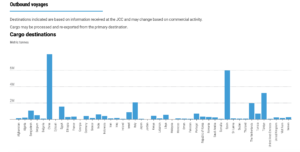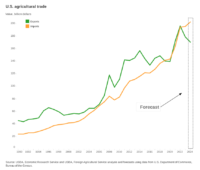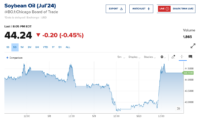Bloomberg's Clarice Couto reported this past Friday that "a surprising tax change in agriculture powerhouse Brazil has the potential to make soy grown in the world’s largest bean exporter less…
Black Sea Grain Deal Abandoned – China Was “Biggest Recipient of Ukrainian Grain Under the Deal”
Financial Times writers Max Seddon, Henry Foy and Adam Samson reported yesterday that, “Russia has formally withdrawn from a UN-brokered deal to export Ukrainian grain across the Black Sea, potentially imperilling tens of millions of tonnes of food exports around the world.
“President Vladimir Putin’s spokesman, Dmitry Peskov, told reporters on Monday that the agreement had ‘essentially stopped‘ and Russia would no longer co-operate with the deal.”
#BSGI should continue regardless of whether rf is a member or not. This is a matter of security for the whole world. The owners of the ship companies are ready to continue working. I appeal to our @UN 🇺🇳partners & Türkiye 🇹🇷 to confirm that they are ready to continue the… pic.twitter.com/JZjzaViTb6
— Oleksandr Kubrakov (@OlKubrakov) July 17, 2023
The FT article noted that, “Carlos Mera, head of agricultural commodities markets at Rabobank, said that without a Black Sea deal, Ukraine would have to reroute exports via its land borders and smaller ports on the river Danube. This would increase costs and reduce farmers’ profits, which could lead them ‘to plant less next season, placing further pressure on supplies going forward.'”
By suspending its participation in the Black Sea Grain Initiative, Russia has dealt another blow to the world’s most vulnerable.
— Ambassador Linda Thomas-Greenfield (@USAmbUN) July 17, 2023
Russia must reverse its decision. pic.twitter.com/Bk5tIkDou0
Seddon, Foy and Samson added that, “Benchmark Chicago wheat prices on Monday traded broadly flat at $6.60 a bushel, after an earlier rally in prices. Grain prices overall have fallen about a quarter since the Black Sea pact was initially agreed, according to Citigroup.”
#corn, #wheat, and #soybeans-- close. pic.twitter.com/M9YUI0SxME
— FarmPolicy (@FarmPolicy) July 17, 2023
Wall Street Journal writer Jared Malsin reported yesterday that, “China, a key international partner for Russia, called for an extension of the deal on Monday.
Despite Beijing’s support of Russia, China has been the biggest recipient of Ukrainian grain under the deal, according to U.N. figures.
“Ukraine has exported 7.9 million metric tons of grain to China, or just under a quarter of the overall amount sent out under the Black Sea initiative.”

And Matthew Mpoke Bigg, Ivan Nechepurenko, Liz Alderman and Farnaz Fassihi reported in today’s New York Times that, “Russia’s announcement came hours after a deadly attack on the Kerch Strait Bridge linking the occupied Crimea Peninsula to mainland Russia. [Kremlin’s spokesman, Dmitri S. Peskov] said the decision to suspend the grain deal was not connected to the attack.”
Russia’s refusal to extend the Black Sea Grain Initiative harms millions of hungry people around the world. Using food as a weapon is unconscionable. We urge Russia to reverse course.
— Secretary Antony Blinken (@SecBlinken) July 17, 2023
The Times article noted that, “The deal between Ukraine and Russia — which is also a major global supplier of grain, oil and other affordable food products — is particularly important in 14 African nations that depend on the two nations for half of their wheat imports, according to the United Nations’ Food and Agriculture Organization. Eritrea is fully dependent on them.”
Looking ahead, our goal must continue to be advancing global food security and global food price stability - @antonioguterres
— UN Spokesperson (@UN_Spokesperson) July 17, 2023
His full remarks 👇https://t.co/hBCHLm5ERK pic.twitter.com/fCMQdCaeaV
Today’s article added that, “The initial agreement allowed Ukraine to restart the export of millions of tons of grain that had languished for months. Food prices have dropped over 23 percent from their peak in March 2022, according to the Food and Agriculture Organization’s Food Price Index. The accord has allowed vital food products to be exported from Ukrainian ports to 45 countries on three continents, the United Nations said.”
I strongly condemn Russia’s cynical move to terminate the Black Sea Grain Initiative, despite UN & Türkiye’s efforts.
— Ursula von der Leyen (@vonderleyen) July 17, 2023
EU is working to ensure food security for the world’s vulnerable. #EUSolidarityLanes will continue bringing agrifood products out of Ukraine & to global…
Meanwhile, Reuters writers Nigel Hunt and Jonathan Saul reported yesterday that, “Under the pact to create a safe shipping channel, Ukraine has been able to export 32.9 million tonnes of agricultural products, including 16.9 million tonnes of corn and 8.9 million tonnes of wheat.
“Before the conflict, Ukraine was exporting roughly 25 to 30 million tonnes of corn a year, mostly through the Black Sea, and 16 to 21 million tonnes of wheat….For a full breakdown of the countries and quantities exported: https://www.un.org/en/black-sea-grain-initiative/vessel-movements“
The #BSGI concludes after almost a year. Shipping corridor nearly empty before end due to inspection disruptions, lessening immediate impact on grain flows. Long-term concern: fractured Ukrainian logistics raise export costs, diminish production incentives in war-strained country
— AMIS (@AMISoutlook) July 18, 2023
The Reuters article pointed out that, “Ukraine’s ports were blocked until the agreement was reached in July last year and it is unclear if it will be possible to ship grain now Russia is withdrawing from the pact.
“Additional war risk insurance premiums, which are charged when entering the Black Sea area, would go up and shipowners could prove reluctant to allow their vessels to enter a war zone without Russia’s agreement.
“Insurance industry sources say that cover arrangements could alter quickly. War risk insurance policies need to be renewed every seven days for ships, costing thousands of dollars.”







